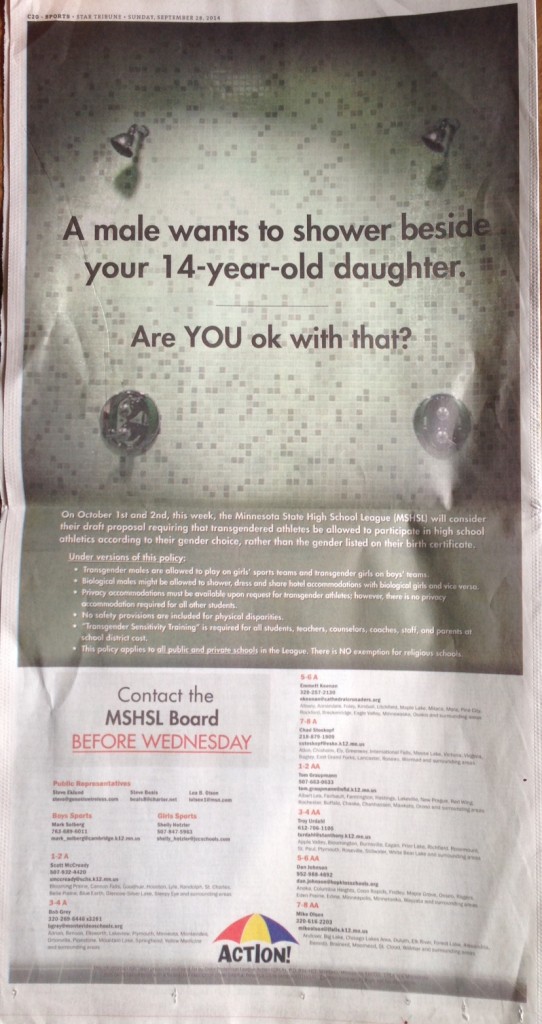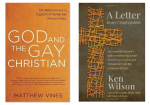Years ago, back when it still happened, I spoke at the Cornerstone Festival. I did a couple gigs there with Phyllis Tickle, and a couple on my own. Then I was on a panel discussion on gays and the church. On the panel with me were Rich Amesbury, a professor of ethics at Claremont School of Theology, Andrew Marin of the Marin Foundation, Christine Sneeringer from Worthy Creations Ministry, and Frank Carrasco of Exodus International. The panel was intriguing, but what happened after was really formative for me.
I met an intersexed person.
I’ve gotten to know that person fairly well, and we talk on the phone regularly. What getting to know an intersexed person has convinced me of is the deep complexity of gender.
As a theologian, it’s often the exceptions to the norm that I need to pay attention to. For example, if you think that the imago dei is rationality, I’ll ask you if a person whose rationality has been damaged — say the victim of a diving accident — is no longer a creature made in the image of God. That might make you rethink your definition of the imago dei.
There’s been a lot of talk on the internet over the last week after Southern Baptist spokesman Russell Moore wrote about how Christians should respond to the “transgender question.” Moore says that transgendered persons are not freaks, but then he goes on to write this:
But we don’t believe this alienation can be solved by pretending as though we have Pharaoh-like dominion over our maleness or femaleness. These categories we believe (along with every civilization before us) are about more than just self-construction, and they can’t be eradicated by a change of clothes or chemical tinkering or a surgeon’s knife, much less by an arbitrary announcement in the high school gym.
The transgender question means that conservative Christian congregations such as mine must teach what’s been handed down to us, that our maleness and femaleness points us to an even deeper reality, to the unity and complementarity of Christ and the church. A rejection of the goodness of those creational realities then is a revolt against God’s lordship, and against the picture of the gospel that God had embedded in the creation.
In other words, Moore says that “male” and “female” are not only the majority categories, they are reified, God-ordained categories. And anyone who does not unequivocally self-identify with one or the other is inherently disordered. Of course, this is not new thinking coming from conservative evangelicals, even if Moore tries to communicate it in more compassionate terms than others have.
Moore’s wrong in a number of ways. Firstly, not every society before us thought of human gender in these categories. In fact, nearly every society had and has other categories — albeit, minority categories — in which people whose gender isn’t specifically male nor female fit. When I lived on the Pine Ridge Indian Reservation in South Dakota, these individuals were called Winkte — that’s the Lakota word for a “two-souls person,” the Native American category for homosexual, trans, and intersexed people. Winktes are not marginalized or persecuted on Pine Ridge, but rather seen as persons with strong medicine. Virtually every ancient society has a similar classification for gay, trans, bi, and intersexed persons.
The supposed “goodness of those creational realities” is a fiction. There are no such categories. Here Moore sounds less like a biblical Christian and more like a Platonist or a Kantian. The Bible, as opposed to dualistic philosophies, is rife with sexual complexity, be it a eunuch or a daughter who has sex with her father. Some minority sexuality is condemned, some is not.
Of course, a conservative is going to try to conserve traditions. It’s just that Moore is dramatically overstating the historic reality.
For a progressive, like me, other inputs like science and human experience modify traditions. Science has shown, unequivocally, that sexuality and gender is far more complex than Moore makes it out to be.
And, for me personally, having a friendship with an intersexed person and hearing how that person experiences the world has done more than anything to convince me that sexuality and gender is irreducibly complex.
See also Andrew Sullivan’s coverage here and here.
How has your experience with GLBTI persons changed your theology of sexuality and gender?











